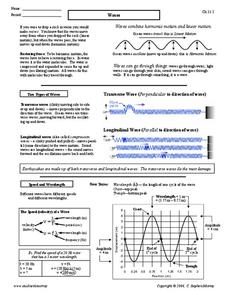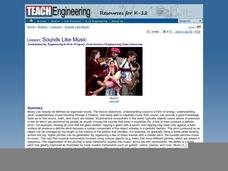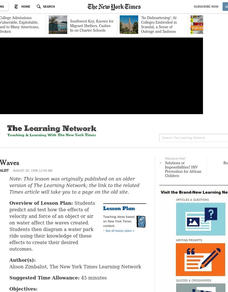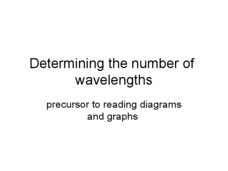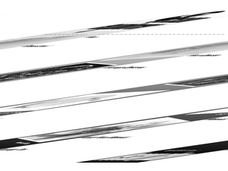Curated OER
Waves
In this waves activity, students read about the different types of waves and how the speed of waves is calculated. Then students complete 5 matching, 8 fill in the blank, and 9 short answer questions.
Curated OER
Calculating Wave Speed
In this wave speed worksheet, students will learn how to calculate the speed of waves by dividing the wavelength by the period. Students will then calculate wave speed for 7 different examples.
Curated OER
High or Low
In this wave properties worksheet, students will experiment to see how the sound made by vibrating a ruler is affected by the length of the part that is vibrating. Then students will answer 5 questions based on the results of the...
Curated OER
Chapter 7 Practice Problems
In this space science instructional activity, students identify ultraviolet beams and what occurs when the frequency is doubled. They identify how long it would take to send a radio message from a space probe of Mars to earth. Students...
Curated OER
Fundamental Properties of a Wave
Middle schoolers investigate the form and motion of a wave, and examine the fundamental properties of wavelength, frequency, and amplitude. They discuss the fundamental properties of a wave, and in small groups conduct an experiment...
Curated OER
Energy Motion in the Ocean
Learners explore the wave energy that is generated and transferred in the ocean. Through the use video and the Internet, students explore the aspects of a wave and how its energy affects the ecology of the seashore.
Curated OER
The Wonderful World of Waves (Wave Basics)
Students define amplitude, wavelength, frequency, and period, calculate period given frequency, and calculate frequency given period, define crest and trough and locate both on diagram of wave, differentiate between latitudinal and...
Curated OER
Sounds Like Music
Young scholars define and examine the connections between sound and music and how engineers design instruments. They listen to examples of musical instruments, view a demonstration of a tuning fork and bottles filled with varying...
Curated OER
Stations of Light
Student groups rotate through four stations to examine light energy behavior: refraction, magnification, prisms and polarization. They see how a beam of light is refracted (bent) through various transparent mediums. Young scholars...
Curated OER
What's the Frequency, Roy G. Biv?
Students examine the concept of frequency and wavelength. They analyze how frequency and wavelength relate to each other by conducting an experiment involving measuring and timing wavelengths by pulling adding machine tape through an...
Curated OER
Colorful Colorado
Students investigate the components of white light as viewed through a prism. The multiple colors of the spectrum produced are related to wavelengths and experienced through the creation of a color wheel.
Curated OER
From Bats to Babies: Ultrasound
Students research and analyze sound waves and how an ultrasound works to image a baby in utero. They explore various websites, complete worksheets, and write a paragraph describing a demonstration they view in the classroom.
Curated OER
THE MANY COLORS OF SUNLIGHT
Students examine rainbow components, spectral colors, colors perceived by the eye, hot solids, glowing rarefied gas, absorption, that light is a wave, and optics.
Curated OER
WAVES AND PHOTONS
High schoolers examine the many types of electromagnetic waves, the concept of an EM wave, how James Clerk Maxwell proposed a slight modification of the equations of electricity, Heinrich Hertz and his radio-frequency, wavelengths, and...
Curated OER
Making Waves
Students predict and test how the effects of velocity and force of an object or air on water affect the waves created. They diagram a water park ride using their knowledge of these effects to create their desired outcomes.
Curated OER
Determining the Number of Wavelengths
After displaying three diagrams showing 1, 1 1/2, and 2 wavelengths, the slide show presents more diagrams and expects pupils to determine the number of wavelengths in each. No labels or explanations are provided, so this would be useful...
Curated OER
The Energy of Light
Students discuss different ways engineers use light. In this engineering instructional activity, students are introduced to the properties of light and the way light is used. They view a demonstration of light waves using a slinky, and...
Curated OER
Electromagnetic Spectrum
Sixth graders observe light being separated into a color spectrum. In this electromagnetic lesson students use a diffraction grating to separate light and compare light sources.
Curated OER
To See or Not to See
Students identify and discuss key factors that determine how effective color camouflage is in certain habitats. In this investigative lesson students divide into groups and study light.
Curated OER
Wave Motion
Students observe and identify various waves. In this wave motion instructional activity, student use a Slinky, noise, people, and musical instruments to create waves and observe how each type of wave moves.
Curated OER
Wave Action
For this waves worksheet, learners compare the characteristics of sound and light waves and determine the wavelength, amplitude, and speed of a wave. This worksheet has 9 problems to solve.
Curated OER
Wave Speed
In this waves worksheet, students use the equation for wave speed to calculate frequency or wavelength. This worksheet has 5 problems to solve.
Curated OER
The Doppler Effect Lab
In this Doppler effect worksheet, students read information about the Doppler effect. Students answer questions as it relates to the pitch and wavelengths of a demonstration simulates what happens with the Doppler Effect.
Curated OER
The Electromagnetic Spectrum
In this electromagnetic spectrum worksheet, students fill in the blanks with terms about the wavelengths and frequencies of the various types of waves in the spectrum. They also compare the sizes of each wave by correlating them with...


